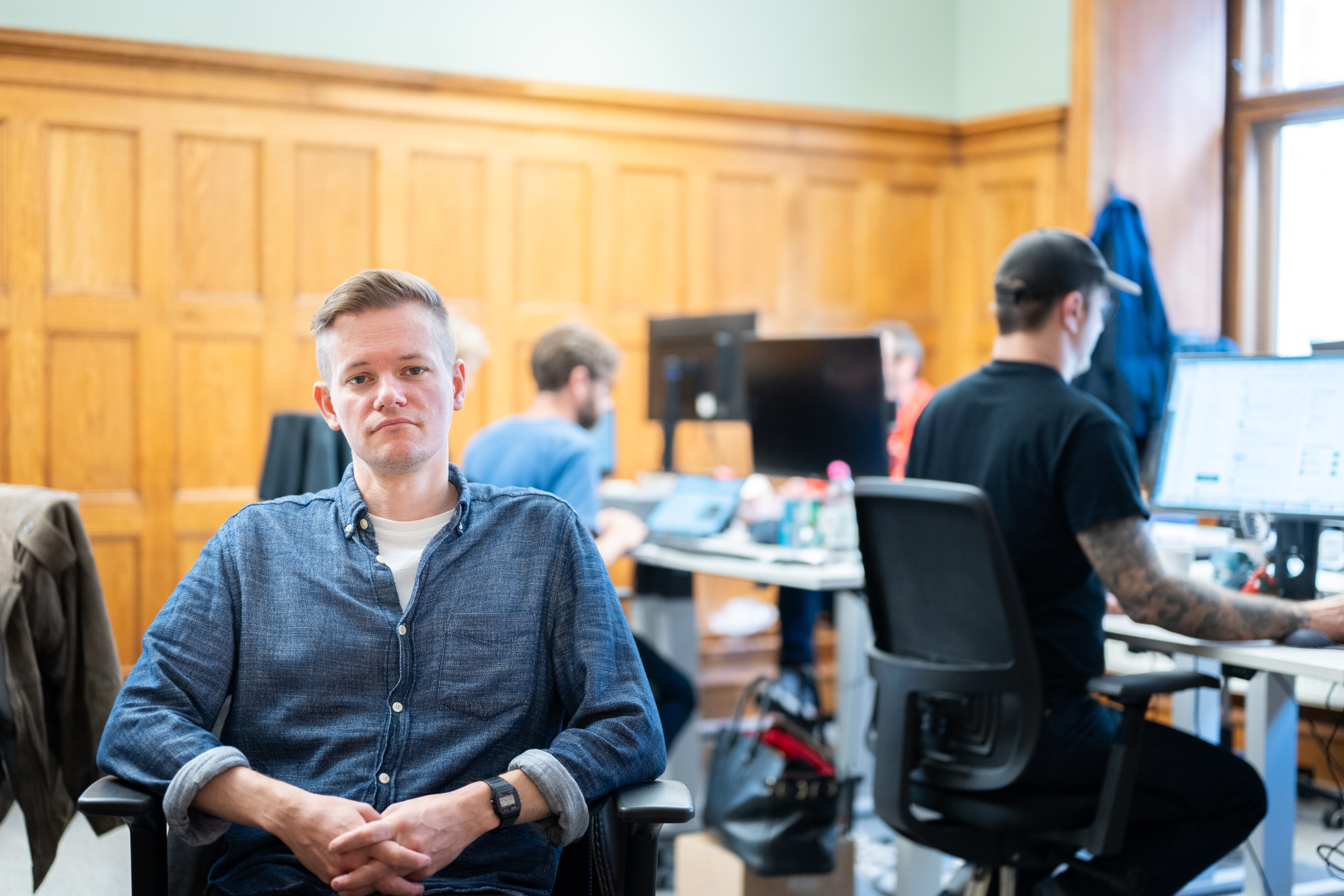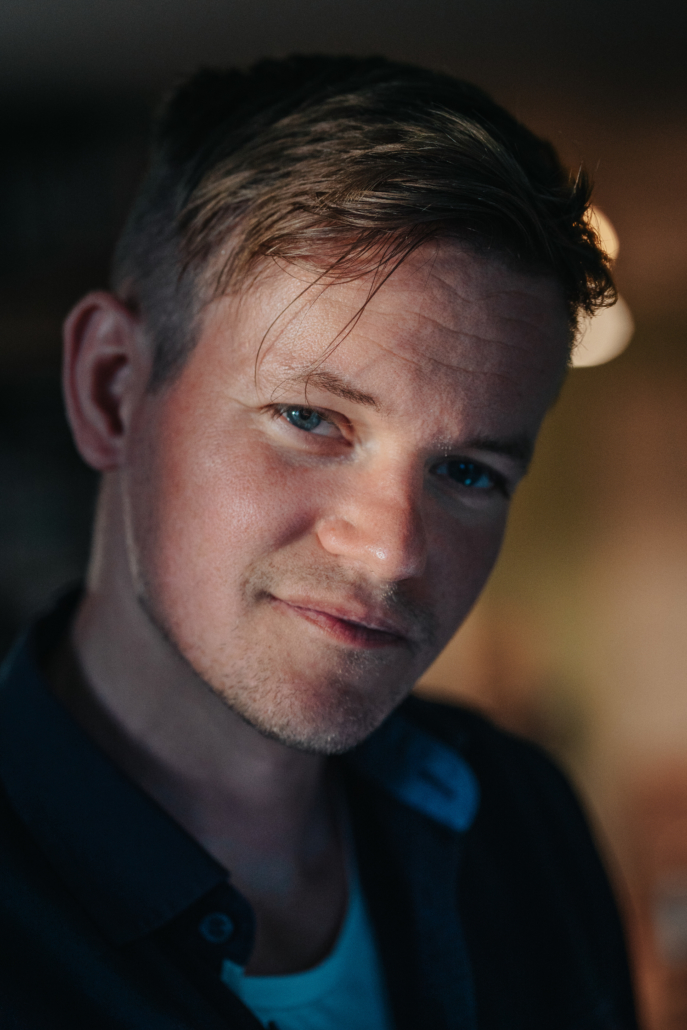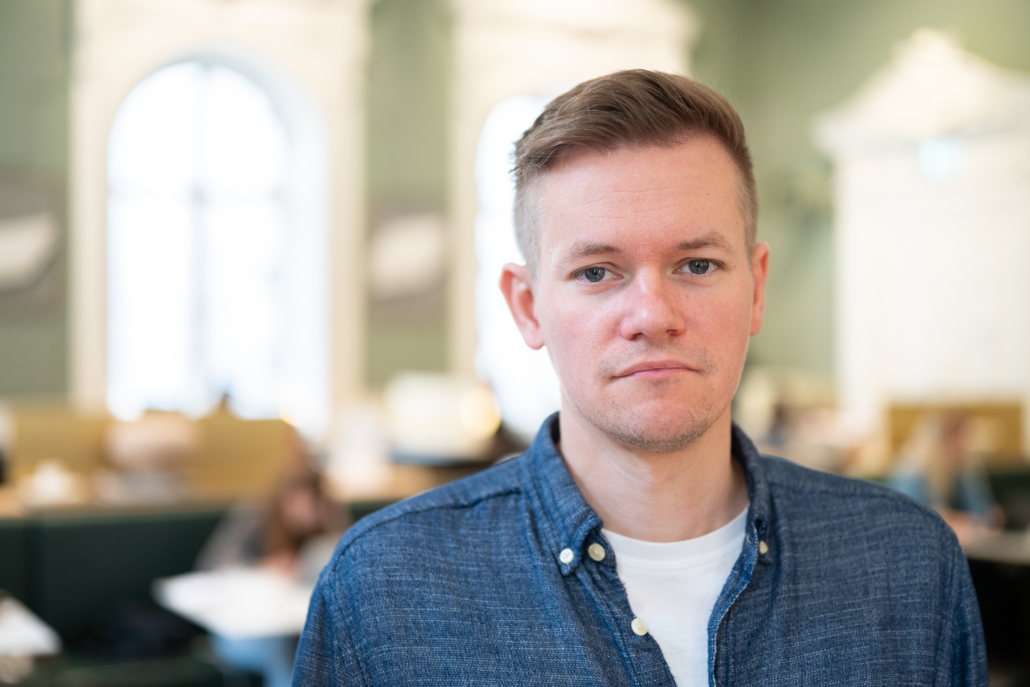“Is this about intimidating journalists?”
“That’s the big question”, says Joakim Medin to PEN Norway before his upcoming trial hearing in Turkey. The Swedish journalist faces more than eleven years’ imprisonment if convicted.
Joakim Medin, a writer and journalist with the Swedish newspaper Dagens ETC, was detained at Istanbul Airport on 27 March 2025 while travelling to cover nationwide protests and arrested the next day. He was later convicted of “insulting the president” over social-media posts about a 2023 Stockholm protest featuring an effigy of President Recep Tayyip Erdoğan, receiving a suspended sentence of 11 months and 20 days, which he is now appealing.
Medin spent weeks in the high-security Marmara Prison on additional charges of “membership of a terrorist organisation” and “making terrorist propaganda,” accusations rooted solely in his journalism and books, before being released and deported to Sweden on 16 May 2025 with a five-year entry ban.
His next hearing on these terrorism-related charges is scheduled for 25 September 2025 at the 13th High Criminal Court in Istanbul, a proceeding that PEN Norway will observe, calling the case a trial of press freedom itself.
In the following interview, Medin recounts his detention, the conditions he faced, and his reflections on press freedom in Turkey.
First of all, thank you for agreeing to this interview. To begin, we thought we’d start with your trip to Istanbul and the circumstances that led to your arrest. Why were you in Istanbul?
I arrived in Istanbul on March 27, 2025. Before that, I had been working in Budapest, and a few days later I was supposed to travel to Israel and Palestine for a longer assignment. But I wanted to squeeze in a visit to Istanbul because of the massive protests happening after the arrest and imprisonment of İstanbul Mayor İmamoğlu.
As we all know, he was arrested in early March together with many other members of CHP, accused of terrorism and corruption. These were the biggest protests against the government in more than a decade in Turkey. From a journalistic point of view, it was very important to cover. That’s why many media outlets came. The Turkish government and the president called the citizens protesting in the streets “terrorists.” There was a lot of violence against them, and many were arrested and brought to the same prison where the mayor was kept — Marmara (Silivri) Prison.
“It seems there is an inflation in Turkey when it comes to labeling people as terrorists and imprisoning them.”
When I arrived in Istanbul, I was detained, accused of being a terrorist, and taken to Marmara Prison too. It seems there is an inflation in Turkey when it comes to labeling people as terrorists and imprisoning them.

Photography by Zanna Nordqvist
What happened when you were detained?
I was first brought to a very small police station at Istanbul Airport, more like a small office.
The police officer there spoke little or no English, so he used the Google Translate app. Through the app, he told me I was “wanted” in Turkey. He printed out a paper and showed it to me. I couldn’t read it since it was in Turkish, but I recognized the word “terrorism.” That’s when I realized this was serious.
“He called another officer, who simply signed my name for me. I was shocked.”
He started interrogating me with Google Translate, asking about my profession, why I came to Turkey, what my plans were, how long I was staying. I spoke into his phone in English, but I don’t know how accurate the translations were. He took notes, printed them as an interrogation protocol, and asked me to sign. I refused, demanding a translation. Then he called another officer, who simply signed my name for me. I was shocked. They did this right in front of me. I wasn’t given a translator, a copy of the protocol, or any information about what was happening next.
Where did they take you after that?
I was driven to a bigger police station in Gaziosman Paşa, in western Istanbul, not far from the airport. They kept me overnight without giving me any translated information. I requested a lawyer. Eventually, the Swedish Consulate in Istanbul found out where I was and sent me a list of available lawyers.
I asked the police to contact them. They refused and said they would call a lawyer for me. I insisted on one who speaks Swedish. The police officer left and returned after a minute, saying this lawyer had refused my case, without explanation. I asked to try another one, and he replied in English: “Not my job.”
I could learn these details thanks to another prisoner who translated for me. He was being deported from Finland and was also detained there.
When did you meet with the prosecutor and how was the procedure?
On the second day, I was brought before a prosecutor in the same area. The only people in the room with me were a notary and a man in civilian clothes who said he was the translator. There was also a small screen in the corner showing the prosecutor, who was in Ankara. I was connected to them through the SEGBIS (judicial video conferencing system) communication system, sitting in a small courtroom next to the police station in Istanbul.
The interrogation started. I quickly noticed that the translator was terrible. He gave the wrong year, wrong details, and kept hesitating. Instead of translating word by word, he summarized both the prosecutor’s questions and my answers. This worried me because every detail mattered.
The prosecutor accused me of being the founder and member of an armed terrorist organization. Later they dropped the word “founder,” so I don’t know if that was a translation mistake. The prosecutor claimed the organization was founded in front of Stockholm City Hall in January 2013 — but then the translator corrected himself: “Sorry, 2023.”
When I heard the year, I immediately realized this was about the mock-up doll of Erdoğan. Some activists had created a doll with a latex mask resembling the president, hung it upside down in front of City Hall, and released photos and videos. The prosecutor showed me screenshots of these photos and of an article I had written, published two months later from that incident, that included a picture of the doll.
He asked: “Is this your article?” I said yes. “So you were at this action in front of City Hall. These are also your photos of the doll.” I explained “no, I was not there. It was an article I co-wrote with other journalists.” The photo was from a later protest against the NATO process and Turkey’s demands on Sweden. They ignored my explanation.
You said that the court interpreter was not good enough. Could you give some examples?
During a break between the interrogation and the hearing with the judge, we sat on a sofa. The translator started showing me pictures on his phone — his flashy car with a built-in TV. He admitted he wasn’t really a translator, but a tourist guide who drove foreigners around Istanbul.
He even offered to show me the city, unaware that I had already been to Turkey over 20 times and knew Istanbul well. Later, my lawyers confirmed there was no record of him in the case file. He was just some amateur they had found.
It was horribly unprofessional, but also sadly typical of what I had written about in my articles: this is the reality many people face in Turkey today. Experiencing it myself was both shocking and frightening, because I couldn’t expect justice in such a system.
What other accusations did they make?
They showed me screenshots of other articles I had written about the NATO process, as well as my reporting from Syria about Kurdish forces fighting ISIS. As we know, those forces were allies of the US-led coalition against ISIS, supported by every NATO country except Turkey. I explained I was one of many journalists reporting from there in 2014 and 2015.
Still, they accused me of making terrorist propaganda because of my reporting. They used screenshots of my articles and some photos I had shared on Facebook and Twitter as evidence of me insulting the president, being a member of an armed terrorist organization, and spreading terrorism propaganda.
This was presented to a judge, who in just a few minutes decided the suspicions were “reasonable.” I was formally arrested and sent first to Maltepe Prison, then two days later transferred to Marmara Prison.
“I was locked up in the political prisoners’ ward, alongside well-known detainees like the mayor of Istanbul and Osman Kavala.”
There I was locked up in the political prisoners’ ward, alongside well-known detainees like the mayor of Istanbul and Osman Kavala. My lawyers pointed out several other famous political prisoners when we met in the visiting area.
Did you have a public defender?
During the interrogation before the prosecutor via teleconference system, I asked about my lawyer. The police had said I would be given a public defender, but I had no contact with this person. Eventually, when I asked “Where is my defender?” a woman in the background said, “I’m here.” That was the only time she spoke. She didn’t say a single word during the entire interrogation with the prosecutor or later with the judge. I was never given her contact details after being transferred to the prison.
I was also denied the chance to call my consulate, but I insisted repeatedly. Finally, they allowed me a short call.
What’s the background of this investigation?
The investigation began in February 2023. They connected me and 14 other Swedish citizens — half of whom are journalists or authors — to the protest in Stockholm with the Erdoğan doll.
What unites us is that we are Swedish or Swedish-Kurdish journalists and authors who have written extensively about Turkey’s authoritarian turn, NATO, and Kurdish issues. I wouldn’t be surprised if they had been tracking us for a long time, waiting for a pretext. I just happened to be the first one of us to travel to Turkey and get arrested.
It’s both scary and strangely flattering that my journalism was considered so important and annoying to them.
What were the prison conditions like?
In Marmara Prison, I met my lawyer Veysel Ok, which was a relief because I was desperate for information. It was during Bayram period, so I wasn’t given enough food or water. Because I was constantly being moved to and from my cell for meetings, I missed breakfast and lunch, and wasn’t given any water.
It became a Catch-221: the guards said I needed money to buy bottled water. But they had confiscated my money, and I had no account yet. I asked for free drinking water. They said I needed to write a petition — but I had no paper or pen. They told me I could buy them at the prison market. Again, I had no money. So I went 24 hours without water until my lawyers demanded I be given a bottle.
I knew that in Turkish prisons you have to pay for almost everything except the light bulb, food, and a blanket. But it was still shocking to experience it firsthand.
“Marmara Prison is often called a “celebrity prison” because of its famous political detainees. I had written about it as such — until I ended up there myself.”
I was kept in complete social isolation for 45–46 days. I could only leave my cell when my consul or lawyers came, about once a week. After one month, I was finally given my one-hour exercise time.
Fortunately, many of my neighbors were well-educated political prisoners who spoke other languages. Some spoke French, English, or even Swedish. Among them were two Kurdish prisoners I had previously written about in my book and articles. They had been denied asylum in Sweden and deported to Turkey.
Suddenly, I found myself in the same ward as them. We could speak Swedish together. I had interviewed their families, lawyers, and human rights organizations before. Now I was their neighbor.

Photograph by Sofie Axelsson
One day, one of them introduced me to another prisoner, saying “This is the Swedish journalist.” He greeted me with “Hi brother” in Swedish. At that moment, the enormous knot of fear and nervousness I had carried in my stomach disappeared. I realized I had people around me to talk to and rely on.
When I told them I hadn’t eaten in over 24 hours, one of them immediately threw apricots, chocolate, and olives over the prison wall into my yard. It was such a powerful moment — I almost cried. I knew then that I was not alone.
What do you expect regarding your case?
Honestly, I don’t know. We all know there is severe political influence in Turkey’s justice system. Some judges and prosecutors try to be semi-independent, but very rarely fully independent.
My lawyers and I don’t expect I will be acquitted completely. Instead, there may be a “middle way,” like my April trial for insulting the president. The harshest sentence would have been three years, but instead I got 11 months and 20 days, suspended. Something similar might happen in my next trial, starting on September 25.
I also don’t know what the Turkish government really wants with these charges. If they wanted to keep me in prison, they wouldn’t have deported me in May and banned me from returning. Their priority seems to be preventing me from coming back.
“Perhaps they want to scare me — and even more, to scare other journalists from writing about Turkey. If I’m sentenced simply for publishing in Swedish, behind a paywall, from outside Turkey, then the same could happen to others. That’s the big question: is this about intimidating journalists?”
Perhaps they want to scare me — and even more, to scare other journalists from writing about Turkey. If I’m sentenced simply for publishing in Swedish, behind a paywall, from outside Turkey, then the same could happen to others. That’s the big question: is this about intimidating journalists?
How do you see the political situation in Turkey?
Turkey is sadly on a very authoritarian path, not far from Russia. Like in Russia, the government imprisons dissidents, opposition politicians, activists, human rights lawyers, and journalists. The difference is that in Turkey, local elections can still bring about some change. But because of this, we also see increasing attacks on CHP. Many people abroad may not fully grasp how severe the situation is.
I think that also from a political side, if it’s a country where the governments for some reason needs to have a close cooperation with Turkey, I think that sadly some people tend to look away… Turkey is still a country that because of NATO, because of the geographical position, because of geopolitics, several or many Western governments must cooperate with Turkey, must have trade with Turkey, etc. Because of this, they choose not to speak out too much.
How does this connect to the peace process?
The peace process has been ongoing since October last year, and at first it seemed promising. But then why would they arrest me and press charges at the same time? It doesn’t make sense.
I do believe the process had some impact on my release and deportation. My lawyers told me several other Kurdish political prisoners accused of terrorism were suddenly released, likely due to the peace process.
Still, the situation is unclear. The government also uses Syria and nationalism in its rhetoric. Populist governments, like Turkey’s, always need an enemy to mobilize voters. That’s why they may keep charges alive while also engaging in negotiations.
I would love to be proven wrong and see real reforms. That would benefit Turkey as a nation.
You were also called a “Turkey hater”? How do you respond this?
That accusation hurt me the most. I am absolutely not a Turkey hater. In fact, I’m crazy about Turkey, especially Istanbul. I introduced the city to my wife, and we’ve visited together. I love its culture, history, food, atmosphere, views — and above all, the people, who are so warm and hospitable.
What I want is a hopeful future for the country I’ve spent so much time in. At the moment, I’m banned from returning and it wouldn’t be safe. But I hope that changes.
What do you expect from international community?
I hope more organizations and individuals get involved in Turkey, supporting actors on the ground and bringing new energy into the peace process. Turkey is often described as a bridge between the Middle East and Europe. That makes it an extremely important country.
Turkey can become a very different country. I hope the international community pays more attention and offers support.
Civil society in Turkey is still fighting, still promoting courage, optimism, and hope. They deserve more international support.
The conflict over minority rights has been going on for more than a century. But it doesn’t have to stay that way. Turkey can become a very different country. There are people working hard for that change, and I hope the international community pays more attention and offers support.




 PEN Norway, Outside the Court house after the hearing on March 2025. The banner says ”Defence can never be silenced, we speak out!’. Photo: PEN NorwayPhoto: PEN Norway
PEN Norway, Outside the Court house after the hearing on March 2025. The banner says ”Defence can never be silenced, we speak out!’. Photo: PEN NorwayPhoto: PEN Norway PEN Norway. Photo: Zanna Nordquist
PEN Norway. Photo: Zanna Nordquist